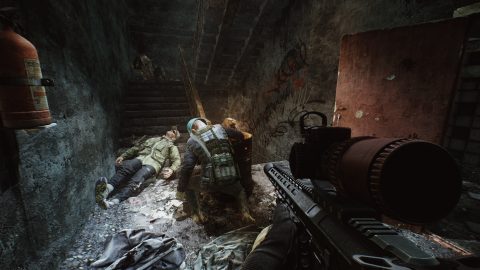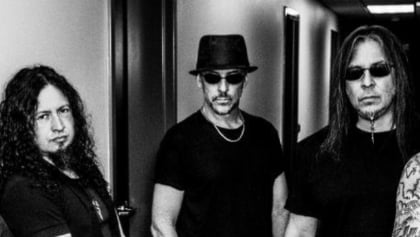
After playing a surprise gig at The Faltering Fullback in London last night (April 28), The Wolfe Tones‘ frontman Brian Warfield has spoken to NME about their upcoming final shows and long-lasting legacy. Check out footage from the show above and our interview with the band below.
The legendary Irish rebel band have chosen to commemorate their 60th anniversary as a band by formally calling an end to their career with a run of final concerts.
Their final ever shows will take place in Dublin’s sold out 3Arena on October 11 and 12, and before that they will play to their biggest ever audience at London’s Finsbury Park on July 5 – you can get your tickets for that here.
They warmed up for those huge shows with a surprise intimate performance in Finsbury Park pub The Faltering Fullback last night, when NME caught up with frontman Brian Warfield to discuss coming to terms with the end of the band, their legacy to “the Irish diaspora” and their impact on the current boom in Irish guitar music.

NME: Hello Brian – 60 years of the band you formed as a teenager are coming to an end. Have you come to terms with it?
Brian Warfield: “Yeah, we more or less have. I think this retirement is the only thing we’ve ever planned, and there’s been a wonderful response all over Ireland, and all over England as well. We’ll always have a huge crowd, but we just can’t go on forever. We haven’t shut the door; something might come up that we can do as a one-off in the future, but at the moment, that’s the plan.
“It’s been a long time, 60 years on the road. It started back in 1964, and we got a contract with Fontana Records, and we were very, very excited about the fact that we got a quarter-page in the NME. It was very special that we had that, seeing us there with all the pop stars and everything else. I think we got as far as about Number 70 on the NME charts! We were over the moon.”
You’ve obviously seen a lot of changes in that time. Have audiences changed over the years?
“Actually, no. Funnily enough, we have been very lucky that we’ve carried the young people of each generation with us. It was very important for the young people of Ireland that they had something with the Irish spirit and an Irish story that they could relate to. It wasn’t just pop songs or pop music, it was a story with a message and with historic content.
“We tried to make Irish people proud, both in Ireland and across the diaspora in England, Scotland, Wales, America, Australia, New Zealand and across Europe. We’ve really had a wonderful time, we’ve seen hundreds of thousands of people. I think we’re very special to the Irish diaspora and they’re very special to us.”
You’ve got one last chance to perform in London coming up on July 5 in Finsbury Park. How special will that night be for you?
“It’s going to be really, really special. I think it’s going to be the biggest crowd ever at an Irish festival, we’ve had traction on the website of hundreds and hundreds of thousands of people wanting to get there. You know, there are probably 6million Irish in Britain, and they love the music and they love the craic. They’re all gonna be there.”

Do you think Irish rebel music resonates with people now in the same way that it did when you started out?
“It’s much more acceptable now than it was. We went through The Troubles in Ireland, which were very hurtful to the Irish people and to Irish communities abroad. I suppose a lot of things were taken out against the Irish community – people would say, ‘Oh, they’re Irish, they’re bloody bombers’ or whatever, you know? There was a lot of demonisation of Irish communities, and the only people speaking up for them at the time was The Wolfe Tones.
“That was very special to us, because we didn’t like to see the Irish people hurting, no matter where they were. During the time of the Guildford Four and the Birmingham Six and all that, we did a show in the Hackney Town Hall to highlight the fact that these people were innocent of the crimes they were accused of. No-one wanted to listen at that stage. One of those jailed once told us, ‘You wouldn’t realise, Brian, what it meant to us in prison when someone came out with a song supporting us. It gave us light at the end of the tunnel, it gave a hope that we would at last be exonerated from something that we didn’t have anything to do with’.”
Irish music is going through a real boom period at the moment, with the likes of Fontaines D.C., Kneecap, The Murder Capital and The Mary Wallopers. A lot of bands have cited you as an inspiration. Do you see the legacy that you have left behind there?
“I do see it when I meet people from other groups who say things like, ‘If only for you guys, we wouldn’t be here’. They found that a group singing Irish music could be very successful in the world, so by watching us, they had hope for themselves to be able to sing the songs of Ireland and still have an element of success in the music industry. I think that was very important, because let’s put it this way, The Wolfe Tones were never played on radio in Ireland, the only way you could hear us was either by CD or else go to one of the shows. And that’s why the shows were very important, they gave people an idea of the spirit that Irish song has.”
Do you see the new bands as continuing your legacy?
“Yeah, Tere are so many new bands coming out at the moment, I can’t keep up with them all. There always have been great Irish bands in Ireland, and from London too – look at the way The Pogues came out of that scene, they used to open for us in The National [in Kilburn, London]. I suppose we’re responsible for a lot of music. The Gallaghers were great supporters of The Wolfe Tones back in the day in Manchester, when we used to go to the Carousel Ballroom and have it packed out with 2000 people.
“We must have been somewhat important to people, it makes you feel very good. We never knew that, of course, but it’s wonderful to hear them show appreciation. It’s all in the past, it’s coming to an end, but it makes you feel very humbled by the great praise that we get from other people.”
The Wolfe Tones play their last London show at Finsbury Park on July 5. Tickets are available here.
The post The Wolfe Tones play surprise London pub gig and tell us about being “very special to the Irish diaspora” appeared first on NME.






